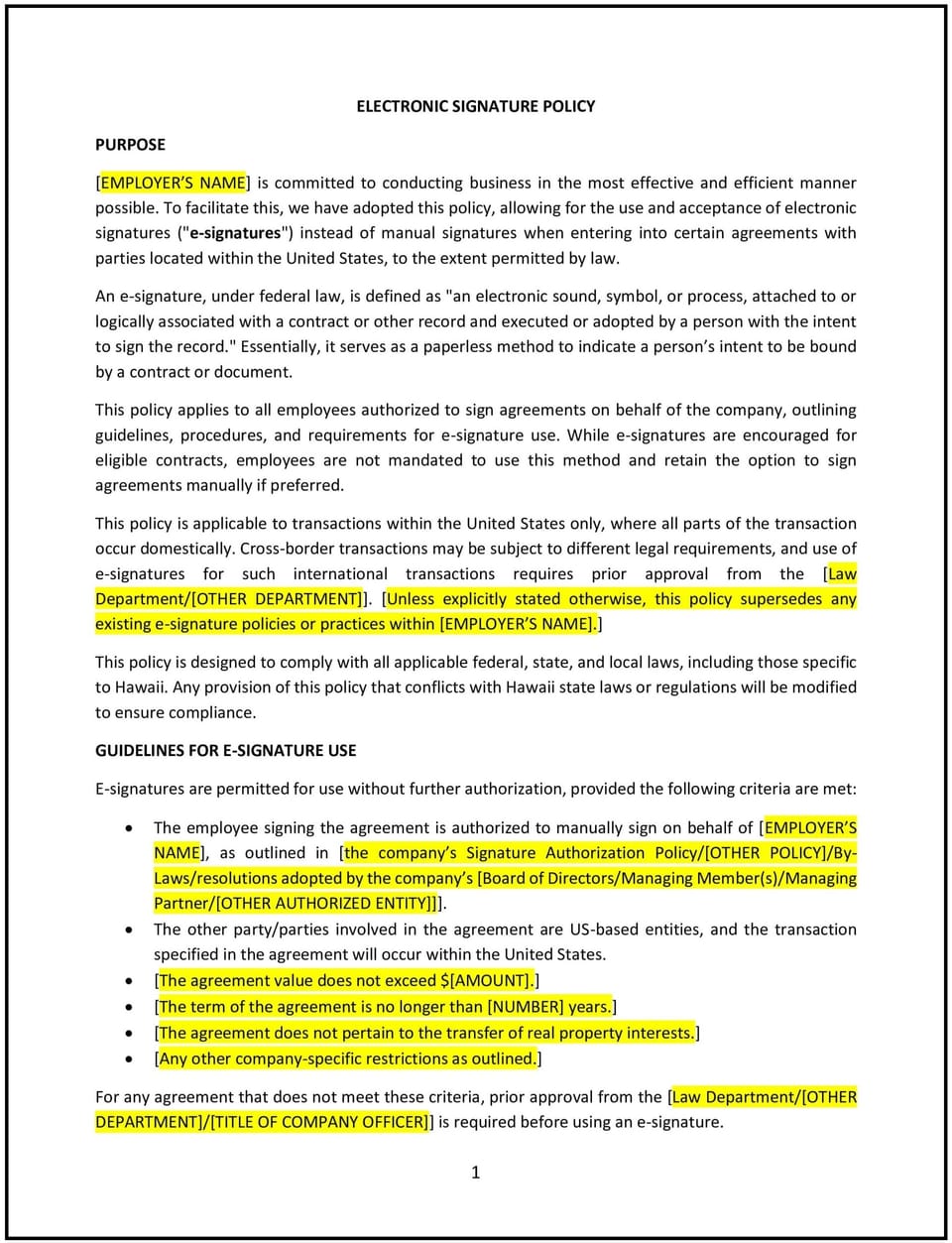Electronic signature policy (Hawaiʻi): Free template

Electronic signature policy (Hawaiʻi)
An electronic signature policy helps Hawaiʻi businesses establish guidelines for using electronic signatures in place of traditional handwritten signatures. This policy outlines the types of documents that can be signed electronically, the technologies and standards to be used, and the procedures for verifying and storing electronic signatures. Tailored to Hawaiʻi’s legal framework, this policy ensures that electronic signatures are legally valid, secure, and consistent with business practices.
By implementing this policy, businesses in Hawaiʻi can streamline document processes, reduce paperwork, and enhance efficiency while maintaining legal and security standards.
How to use this electronic signature policy (Hawaiʻi)
- Define acceptable uses: Specify the types of documents that can be signed electronically, such as contracts, agreements, or internal approvals, and any exceptions that require handwritten signatures.
- Establish technology standards: Outline the electronic signature technologies and platforms that meet legal and security requirements, such as those compliant with the U.S. Electronic Signatures in Global and National Commerce (E-SIGN) Act and Hawaiʻi state laws.
- Verify identity: Provide procedures for verifying the identity of individuals using electronic signatures, such as multi-factor authentication or secure login credentials.
- Ensure security: Implement measures to protect electronic signatures from unauthorized access, tampering, or fraud, such as encryption and audit trails.
- Document storage: Specify how electronically signed documents should be stored, including retention periods and backup procedures, to ensure accessibility and compliance.
- Communicate the policy: Share the policy with employees during onboarding and through internal communications to ensure awareness and understanding.
- Train employees: Educate staff on the policy’s guidelines, including how to use electronic signatures securely and effectively.
- Monitor compliance: Regularly review electronic signature practices to ensure adherence to the policy and address any issues promptly.
- Review and update the policy: Regularly assess the policy’s effectiveness and make adjustments as needed to reflect changes in laws, technology, or business needs.
Benefits of using this electronic signature policy (Hawaiʻi)
This policy offers several advantages for Hawaiʻi businesses:
- Streamlines processes: Electronic signatures reduce the time and effort required to sign and manage documents, improving efficiency.
- Reduces paperwork: Minimizing the need for printed documents supports environmental sustainability and reduces storage costs.
- Enhances security: Secure electronic signature technologies protect against fraud and unauthorized access.
- Improves accessibility: Electronically signed documents can be accessed and shared easily, supporting remote work and collaboration.
- Aligns with legal standards: The policy helps businesses comply with the U.S. E-SIGN Act and Hawaiʻi state laws regarding electronic signatures.
- Encourages consistency: Clear guidelines ensure all employees use electronic signatures in a standardized and secure manner.
- Builds trust: A transparent and secure electronic signature process demonstrates professionalism and reliability to clients and partners.
Tips for using this electronic signature policy (Hawaiʻi)
- Communicate the policy effectively: Share the policy with employees during onboarding and through regular reminders, such as emails or training sessions.
- Provide training: Educate staff on the policy’s guidelines, including how to use electronic signatures securely and effectively.
- Use reliable technology: Implement electronic signature platforms that meet legal and security standards, such as those compliant with the E-SIGN Act.
- Monitor compliance: Regularly review electronic signature practices to ensure adherence to the policy and address any issues promptly.
- Be transparent: Clearly explain the policy’s purpose, benefits, and expectations to employees to build trust and cooperation.
- Review the policy periodically: Update the policy as needed to reflect changes in laws, technology, or business needs.
Q: Why should Hawaiʻi businesses adopt an electronic signature policy?
A: Businesses should adopt this policy to streamline document processes, reduce paperwork, and ensure electronic signatures are legally valid and secure.
Q: What types of documents can be signed electronically?
A: Businesses should specify which documents can be signed electronically, such as contracts, agreements, or internal approvals, and any exceptions that require handwritten signatures.
Q: What technologies should businesses use for electronic signatures?
A: Businesses should use electronic signature platforms that comply with the U.S. E-SIGN Act and Hawaiʻi state laws, ensuring legal validity and security.
Q: How should businesses verify the identity of signers?
A: Businesses should implement procedures such as multi-factor authentication or secure login credentials to verify the identity of individuals using electronic signatures.
Q: How should electronically signed documents be stored?
A: Businesses should specify storage procedures, including retention periods and backup methods, to ensure accessibility and compliance.
Q: What training should businesses provide to employees?
A: Businesses should educate staff on the policy’s guidelines, including how to use electronic signatures securely and effectively.
Q: How often should the policy be reviewed?
A: The policy should be reviewed annually or as needed to reflect changes in laws, technology, or business needs.
This article contains general legal information and does not contain legal advice. Cobrief is not a law firm or a substitute for an attorney or law firm. The law is complex and changes often. For legal advice, please ask a lawyer.


